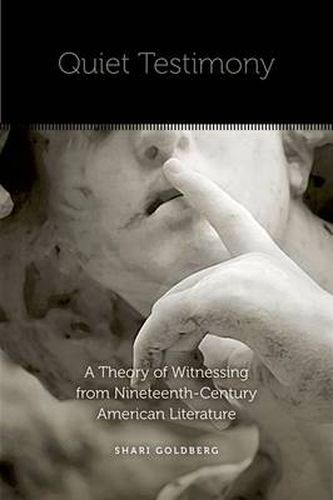Readings Newsletter
Become a Readings Member to make your shopping experience even easier.
Sign in or sign up for free!
You’re not far away from qualifying for FREE standard shipping within Australia
You’ve qualified for FREE standard shipping within Australia
The cart is loading…






The nineteenth century was a time of extraordinary attunement to the unspoken, the elusively present, and the subtly haunting. Quiet Testimony finds in such attunement a valuable rethinking of what it means to encounter the truth. It argues that four key writers-Emerson, Douglass, Melville, and Henry James-open up the domain of the witness by articulating quietude’s claim on the clamoring world.
The premise of quiet testimony responds to urgent questions in critical theory and human rights. Emerson is brought into conversation with Levinas, and Douglass is considered alongside Agamben. Yet the book is steeped in the intellectual climate of the nineteenth century, in which speech and meaning might exceed the bounds of the recognized human subject. In this context, Melville’s characters could read the weather, and James’s could spend an evening with dead companions.
By following the path by which ostensibly unremarkable entities come to voice, Quiet Testimony suggests new configurations for ethics, politics, and the literary.
$9.00 standard shipping within Australia
FREE standard shipping within Australia for orders over $100.00
Express & International shipping calculated at checkout
The nineteenth century was a time of extraordinary attunement to the unspoken, the elusively present, and the subtly haunting. Quiet Testimony finds in such attunement a valuable rethinking of what it means to encounter the truth. It argues that four key writers-Emerson, Douglass, Melville, and Henry James-open up the domain of the witness by articulating quietude’s claim on the clamoring world.
The premise of quiet testimony responds to urgent questions in critical theory and human rights. Emerson is brought into conversation with Levinas, and Douglass is considered alongside Agamben. Yet the book is steeped in the intellectual climate of the nineteenth century, in which speech and meaning might exceed the bounds of the recognized human subject. In this context, Melville’s characters could read the weather, and James’s could spend an evening with dead companions.
By following the path by which ostensibly unremarkable entities come to voice, Quiet Testimony suggests new configurations for ethics, politics, and the literary.